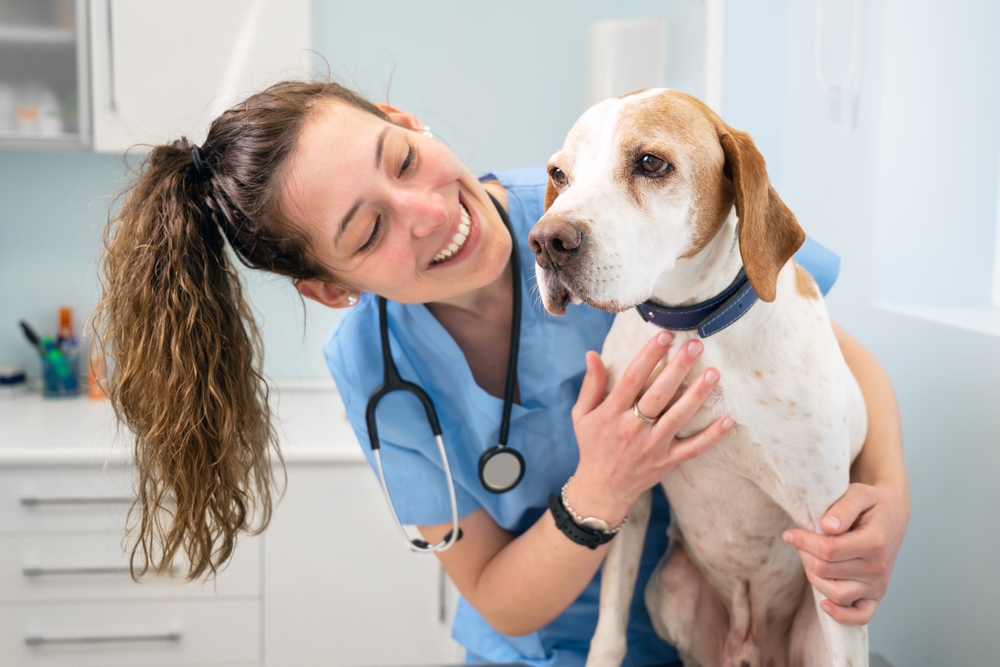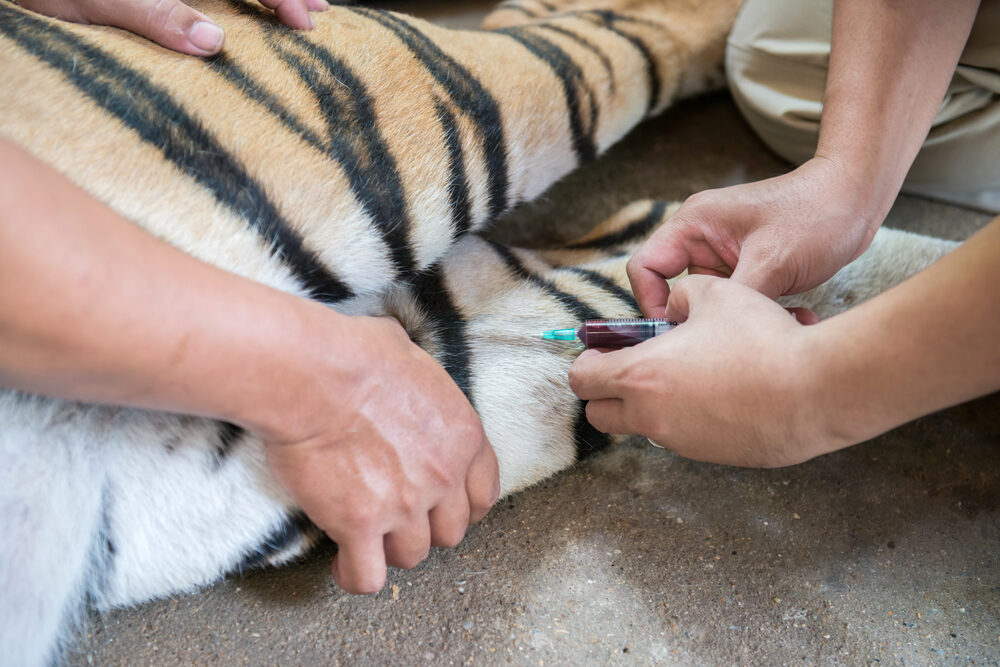
☝️ The most important facts in brief
- The veterinary medicine degree programme in Germany usually lasts 11 semesters and is completed with the state examination.
- It is a highly sought-after degree programme, which is why a numerus clausus applies.
- The programme content is varied and sometimes requires a high level of mental resilience.
- The veterinary medicine programme is currently only offered at 5 German universities.
- After obtaining their licence to practise, veterinarians can work in many different areas.
📖 Table of contents
Studying veterinary medicine involves intensive training in theory and practice. Prospective veterinarians learn how to treat different animal species and deal intensively with the anatomy and metabolism of different animals and, of course, animal diseases. After the 11-semester standard period of study and passing the state examination, you can practise as a vet.
Contents and aims of the programme
The 11-semester standard period of study in veterinary medicine is divided into the same essential sections and subjects at all universities. The degree programme begins with the basics, followed by a practical part and ends with the state qualification that entitles the student to practise as a veterinary surgeon.
We would now like to explain the individual sections and the corresponding learning content in a little more detail.
The theoretical part
In the theoretical part of the veterinary medicine degree programme, the basics are taught first. This includes scientific subjects such as chemistry, Physics and of course biology. Basic knowledge of agriculture, medical terminology and the history of veterinary medicine are also part of the content here. This part is concluded with the first major examination, the pre-physical examination.
For the Physikum, the list of learning requirements then includes some much more specific areas. These include the basics of animal breeding, knowledge of heredity and various animal diseases as well as a comprehensive knowledge of physiology and anatomy.
The practical part
Similar to studying medicine, the practical part of your studies follows the Physikum. In addition to the lectures, there are many prescribed internships that you must complete in order to learn certain skills directly on animals and, among other things, to familiarise yourself with the structure of animal-related businesses. The following list shows some of the internships that are required in order to be admitted to the state examination:
- A total of 20 weeks internship in a veterinary practice
- 2 weeks internship in food control
- 3 weeks internship at the ante-mortem and post-mortem inspection department
- 2 weeks internship in public veterinary services
The subjects, lectures and courses at the university are now much more practical. Topics include the effect of medication on various animals, Surgery and anaesthesiology. Information on feed and nutrition, interactions between animal husbandry and the environment and measures for the welfare of farm and laboratory animals are also covered in this part of the programme.
The veterinary examination
The degree programme ends with the state examination. In order to be admitted to this, you must have passed all the examinations required during the degree programme and completed the necessary internships. After successfully completing the veterinary medicine degree programme, graduates are entitled to work as veterinarians.
The various career opportunities after graduation
Once you have passed the veterinary examination, your career prospects are varied. For example, you now have the opportunity to use the knowledge you have acquired during your studies to treat animals in a private practice, either as an employee or independently. This is also the job that most people think of first when they hear of a vet.
Alternatively, the work of veterinarians is also in demand in animal breeding, zoos, research centres, equestrian sports, public veterinary services and many other areas.
Although further training to become a specialised veterinarian following your studies in veterinary medicine is not mandatory, it can open many more doors for you. With this additional training, you will be even better equipped to help animals and people in your preferred field of work.

Vets don't just have to understand animals
Especially if you want to treat pets in a private practice later on, your job will always involve dealing with people. Pet owners suffer with their animals and unfortunately you will not always be able to help them. It is therefore important to have both empathy and mental resilience.
Sensitivity is also required when it comes to convincing people to change the conditions in which their animals are kept or fed. Here it is important to find clear words and yet not be too brash.
What salary can you expect after graduation?
Unfortunately, veterinary medicine is not a field of study that promises particularly high earnings after graduation. As a student, you therefore need to have a strong desire to work with animals and, if necessary, their humans, in order to find happiness in this profession.
After completing their studies, many newly qualified veterinarians initially take up a position as an assistant doctor at a veterinary clinic. The expected salary here is around 2,500 euros.
As a veterinarian in the public veterinary sector, you earn comparatively well compared to other areas of veterinary medicine. If your application is accepted there, you can start with a Vet salary of around 4,000 euros, which can rise to well over 6,000 euros with increasing professional experience.
Higher salaries are possible as a vet in less popular areas
Salaries can be somewhat higher in ante-mortem and post-mortem inspection and on livestock farms. However, for very few prospective vets, the abattoir is the place they dreamed of for their future job when they decided to study veterinary medicine.
Which universities offer the veterinary medicine degree programme?
There are currently only five universities in Germany where you can study veterinary medicine:
- University of Veterinary Medicine Hanover
- Ludwig-Maximilians-University Munich
- Justus Liebig University Giessen
- University of Leipzig
- Free University (FU) Berlin
The requirements for studying veterinary medicine
To study veterinary medicine, you need a general higher education entrance qualification or alternatively a subject-specific higher education entrance qualification. The application for a study place is handled centrally by the Stiftung für Hochschulzulassung (formerly ZVS). You can submit your application online here.
Veterinary medicine is a degree programme with NC
Veterinary medicine is a highly sought-after degree programme, which is why not every application for a place is successful. A good Abitur is an important prerequisite. In the past few years Veterinary Medicine NC A A-levels are required throughout.
You can improve your chances by taking the (fee-based) test for medical degree programmes (TMS) and thus prove that you have the knowledge and skills required for this degree programme.
Studying veterinary medicine abroad as an alternative
Your A-levels are not good enough to be accepted to study veterinary medicine at one of the German universities? Then it might make sense, Veterinary medicine abroad to study.
There are some very good universities at which the admission requirements are regulated differently than in Germany and where a Study veterinary medicine without NC is possible. We will be happy to take care of the application for you and help you to realise your dream after all.





